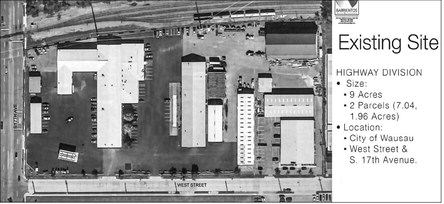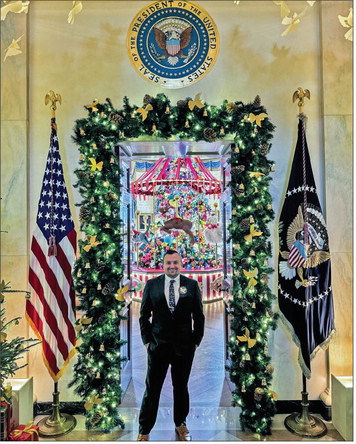New Highway shop site considered


By Kevin O’Brien
Marathon County may once again be on the verge of purchasing land for a new Highway Department headquarters, but the question of how to pay for the estimated $59 million facility remains unanswered at this point.
After meeting in closed session at a joint meeting last Thursday, members of the Infrastructure Committee and Human Resources, Finance and Capital (HRFC) authorized county staff to negotiate an offer to purchase land for the future development of a Highway shop. Supervisor Chris Dickinson voted against the motion, and supervisor Tom Seubert clarified that the motion does not mean the county will necessarily buy the property under discussion.
The HRFC met in closed session back in September to discuss the possible purchase of land for a new Highway shop, but no action was taken at that time. Previous efforts to find a new home for the department somewhere in the Wausau area have failed, partly because municipal officials did not want to rezone land to accommodate a large Highway facility.
In addition to the possible relocation of the Highway shop, the Dec. 5 joint meeting agenda featured several items related to how the county pays for repaving highways, which is partially funded with a $25 per vehicle registration fee (also known as a “wheel tax.”) During last month’s 2025 budget discussion, several members of the county board expressed a desire to repeal the wheel tax and look at spending down the $56 million in the Highway’s reserve fund. An amendment to remove all of the anticipated wheel tax revenue from next year’s budget was voted down after corporation counsel Michael Puerner said the fee would continue to be collected unless the board officially repealed the tax.
However, another amendment to take $1 million out of the Highway reserve fund in order to lower property taxes was adopted, and it also kicked off a larger conversation about how the county uses its reserve funds. Supervisor John Robinson, chair of the HRFC, originally said the joint meeting would feature a presentation by finance director Sam Fenzke on the purpose of the county’s reserve funds, but Fenzke was not able to attend because of a training conference.
Instead, most of the meeting was dedicated to discussing the potential Highway shop relocation, which has been studied multiple times over the years.
Dickinson requested that the agenda be amended so that supervisors could talk about the wheel tax first, but supervisor Randy Fifrick, chair of Infrastructure, said he preferred to keep the order of the agenda as originally written.
Highway commissioner Jim Griesbach spoke about the need to move the Highway Department out of its current headquarters on the corner of West Street and South 17th Avenue in Wausau, where it has been since the 1930s.
“It served it us well back in the day, but we have simply outgrown the space,” he said, noting that his department is running out of room to store its over 320 pieces of equipment.
Griesbach said the cramped quarters and proximity to a hightraffic intersection present safety hazards, especially with plow trucks and heavy machinery pulling in and out of an area with increasing pedestrian activity.
“At some point somebody is going to get clipped,” he said.
County administrator Lance Leonhard spoke about the options for financing the nearly $60 million facility, including a tentative proposal to borrow $30 million and cover the remaining amount with reserve funds. A hypothetical debt repayment schedule pro-
See HIGHWAY SHOP/ page 16
NO ROOM TO GROW - An aerial picture of Marathon County’s existing Highway Department headquarters in Wausau shows the limited space available for additional vehicles and equipment. The site is also located on the busy intersection of South 17th Avenue and West Street. Highway shop
Continued from page 3
vided to supervisors shows the tax impact of issuing $30 million in bonds in 2027 and paying it back over 10 years.
Ideally, the county would borrow the money it needs for the new shop at about the same time it is paying off previous debt, allowing the tax levy to stay relatively stable, Leonhard said.
If no new debt is issued, the county’s annual debt payments are projected to fall substantially in 2032, from $1.3 million down to about $317,000, according to a chart provided to the committee. However, if a new $30 million bond were issued in 2027, the amount of taxes needed for debt service would spike for a few years before leveling off at under $3 million per year.
“There’s a path forward where, if you utilize a significant amount of fund balance (reserves), you can essentially level out that debt service so you don’t have a significant increase in tax rate,” Leonhard said.
Board chairman Kurt Gibbs said having the $3 million per year in revenue from the wheel tax, which is relatively inexpensive to collect, helps save money in the long run by reducing the amount of money the county has to borrow and pay back with interest.
“If we want to talk about being fiscally conservative and respectful of the taxpayer, I think we have to look at that also,” he said.
Dickinson disputed this notion. “Fiscally conservative is not taking $3 million a year and putting it into a reserve of unused funds to build up a $30 million cash bag that you then decide to use for something it was never intended to be used for,” he said.
Following the closed session, the committee had a discussion about how the county pays for its annual repaving of about 30 miles of county highways, but the conversation was kept short because the HRFC had another joint meeting scheduled with a different committee. The committee also tabled an item about possibly assigning reserve funds for the Highway shop.
Supervisor Seubert said it’s his understanding that there are enough votes on the board to repeal the wheel tax, but first he wants to know what the plan is for making up the $3 million generated by the $25 registration fee and how that might increase property taxes.
“That way we can decide if it’s better to add it on to the (property) taxes or continue with the wheel tax,” he said.
Another joint meeting Infrastructure and HRFC was tentatively set for Jan. 9.


